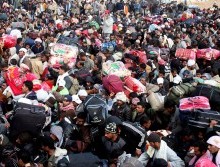The Barack Obama administration had such high hopes for US relations with the Muslim world. Even Iran got an “open hand” of diplomacy back in the nascent days of the new American government. But the past week has shown that while the US can have beneficial links with Muslim governments, there’s a difference between friendly relations and friendship.
The violence against US embassies and consulates in Muslim nations is purportedly over a film that hit the internet. True, Danish missions were targeted in the past over cartoons, but the more troubling aspect to this round of violence is its extent—and how far it reaches.
The assault on the diplomatic mission in Benghazi, Libya and murder of US Ambassador Christopher Stevens was shocking. Didn’t the US lead the outster of Muammar Gaddafi? And this is the repayment?
True, the Libyan government was involved in rescuing the Americans under attack. And they’ve expressed condolences etc. So the leaders have acted friendly. But CBS reported that the secret US safehouse was clearly exposed to the terrorists.
Even the deputy Libyan interior minister admitted there could be spies in their security ranks, although he tried to argue the terrorists could have simply followed the caravan of diplomats.
In other words, Libya’s government might be friendly. The people inside the country—including even government security members tasked with secret knowledge of US facilities—might not be. In fact, we know some of the Libyans aren’t.
And Egypt? The protests of the US Embassy Cairo are troubling enough. True the Egyptian security forces have attempted to support the US. But the protests recall the stunning breaching of the Israeli embassy last year.
In other words, the government of Egypt might be doing at least a minimum of what is expected from a friendly country. Maybe. But there are quite a number of Egyptians that aren’t friendly at all.
And across the region Americans are concerned about other nations as well. Now having shakey relations with peoples but stable ties with their governments is nothing new for the US. But it does raise questions about just how genuinely trustworthy those governments are—especially now that they are electable by those people in the countries.
So the lesson to be learned is that the US should sleep with one eye open in Egypt, Libya and elsewhere. Giving aid and making beneficial ties are still useful moves. But these nations aren’t true friends. There’s a limit to how much intelligence they can be trusted to keep. Not to mention what weapons should be sold there.
Ironically, one of the closest friends to the US in the Middle East, Israel, looks to like they are being viewed with suspicion. US officials have publicly disagreed with the Israelis and may have even hurt their deterrence by openly criticizing the potency of an Israeli strike on Iran.
To borrow a refrain from Obama’s challenger, Republican presidential candidate Mitt Romney, it’s time to treat friends like friends and enemies like enemies. And quasi-friends like quasi-friends.
(By Joshua Spurlock, www.themideastupdate.com, September 16, 2012)

